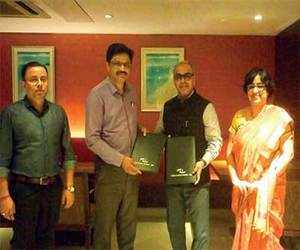
In what could give Indian indigenous medicine a boost, a herbal concoction used by a 60-year-old woman to treat early stage cataract of people in in Tamil Nadu’s Madurai district may soon make its way to market shelves.
This traditional wisdom used by herbal healer Muthulakshmi for decades may be commercialised after Ahmedabad headquartered National Innovation Foundation (NIF) which supports such grassroots innovations has signed an MoU with Dabur Research Foundation earlier this year to develop and commercialise the product.
The herbal medicine which was used to treat early stage cataract patients is currently up for clinical trials and is expected to hit the markets in 6 months.
“We scouted this product with the help of Honey Bee Network, our collective a few years ago. In the past we have validated traditional knowledge and practices of people that are unavailable in classical codified texts with the help of ICMR (Indian Council of Medical Research). We got excellent results with the herb that treats patients with early state cataract after preliminary tests were conducted on this herbal medicine tested with PERD (Pharmaceutical Education & Research Development) Ahmedabad.
Later we signed a co-development agreement (MoU) with Dabur Research Foundation earlier this year for testing and developing the herbal medicine. Dabur also has the first right of refusal and can pay market cost for the technology,” said Vipin Kumar, director & chief innovation Officer(CIO) of NIF-India, an autonomous body of DST, Govt of India.
Kicking off the momentum for indigenous traditional medicine made from a flower and administered by Muthulakshmi to treat cataract patients in her region, may be available commercially in an affordable format after it is developed as a viable herbal product.
“We have signed a broad-based MoU and are working with NIF to develop herbal-based products to treat humans through the non-codified herb. The flower is indigenous and grows widely in the country. However, knowledge of this traditional medicine may be lost if it is not passed on to the people. The formula needs to be checked for efficacy on cells and duplicated and made affordable to poor. Through preliminary data we are trying to see if the extract has the potential to cure and will be conducting a clinical trial on 200 subjects.
We are currently in the process of finalising a chemical centre. The money generated through the IPR or patent of this herbal medicine and its royalty will go to the inventor Muthulakshmi and not to us or the NIF. The product can be commercialised within 3 to 6 months once clinical trials are over. Once the product formulation is complete we would obviously not like to refuse it and bring it at affordable rates as our CSR and try to make it low cost for people,” said Dr Manu Jaggi, chief scientific officer, Dabur Research Foundation.
source: http://www.ahmedabadmirror.com / Ahmedabad Mirror / Home> Ahmedabad> Others / June 29th, 2018